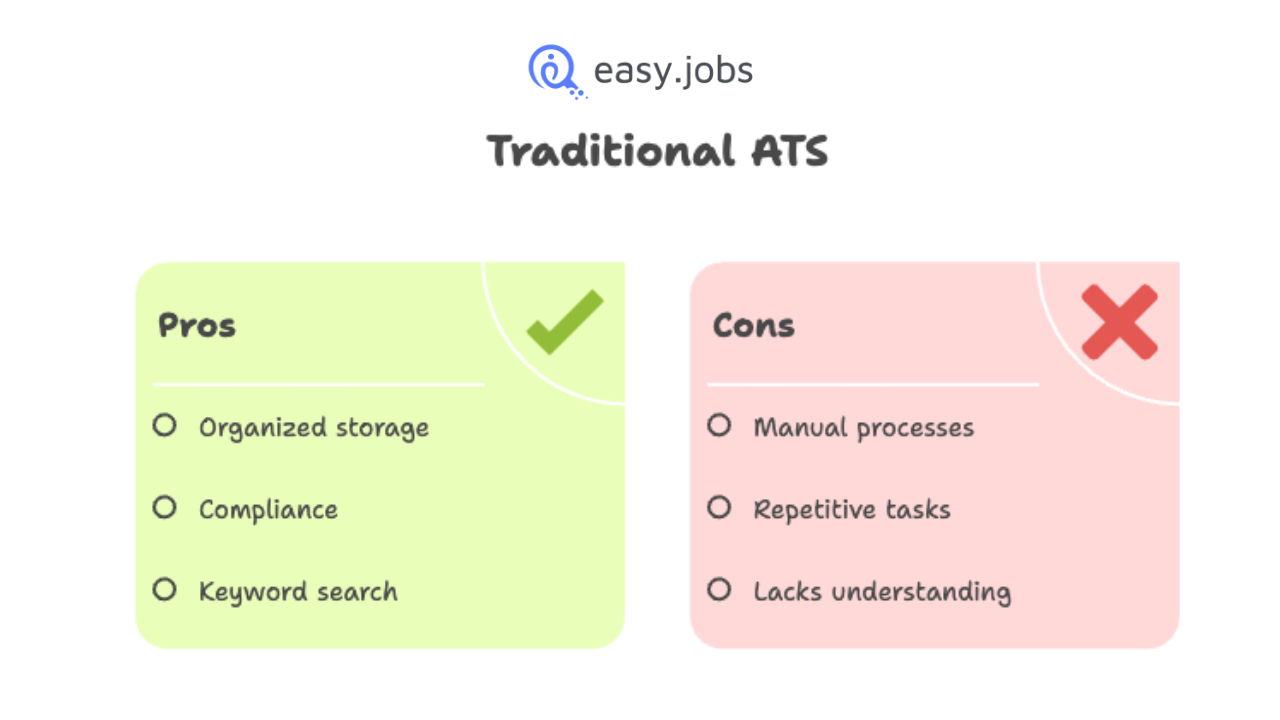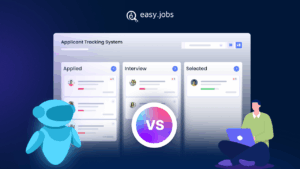As a recruiter, is your desk stacked with resumes and not enough time to sort them? You are not alone. That is where the AI-powered ATS vs traditional ATS debate begins. A traditional ATS is your digital filing cabinet, it stores resumes but stops there.
An AI-powered ATS, however, is your smart assistant; it reads, understands and helps you pick the best fit. With recruitment automation og intelligent candidate matching, hiring gets faster, smarter and fairer. Let us explore which system truly fits your recruiting future.

What is a Traditional ATS? (The Digital Filing Cabinet)
A traditional ATS or applicant tracking system is every recruiter’s first step into the world of digital hiring tools. Think of it as your organized digital filing cabinet. It keeps every resume neatly stored, helps you stay compliant and makes sure no candidate slips through the cracks. Here is what a traditional ATS does well:
- Stores candidate applications in one place, so you do not lose track of them.
- Keeps hiring compliant by maintaining detailed records for audits and HR policies.

It is mostly manual. You still have to read, review and rank every application yourself. You have to send rejection emails one by one. You decide who to shortlist and that means hours of repetitive work. In short, a traditional applicant tracking system (ATS) is great at storing resumes, not understanding them.
What is an AI-Powered ATS? (The Smart Assistant)
If a traditional ATS is a filing cabinet, then an AI-powered ATS is your personal recruiting assistant. One that never sleeps, never forgets and keeps learning from every hire you make.
Unlike the old system that just stores resumes, an AI-powered applicant tracking system (ATS) reads them. It analyzes patterns, understands job context and predicts which candidates are the best match. Even if they do not use the same keywords. Here is what makes it truly smart:
- Learns from your hiring decisions. The more you use it, the smarter it gets recognizing what a “good hire” looks like for your team using the AI Features.
- Automates your repetitive tasks through recruitment automation, such as screening resumes, scheduling interviews and sending follow-up emails.
- Finds quality candidates faster ved hjelp av intelligent candidate matching, which looks beyond keywords to understand skills, experience and fit.

Imagine searching for a “Software Engineer” and your system instantly shows not just those exact titles, but also how well they fit the job description perfectly. That is the power of an AI-powered applicant tracking system. It does not just collect data; it connects it. It helps you spend less time filtering and more time hiring the right people.
Key Differences: AI-Powered ATS vs Traditional ATS

Now that you know what each system does, it is time for the real test. How do they perform side by side? As a recruiter, your time, efficiency and candidate experience depend on the system you choose. Let us compare AI-Powered ATS vs Traditional ATS across the three areas that matter most: search accuracy, workflow efficiency and candidate experience.
🔍 Search: Intelligent Candidate Matching vs Keyword Filtering
Your traditional ATS works like a basic file cabinet. It only keeps records of resumes with added features that focus on the process. If your ATS does not automate and make the process faster, better, it is invisible.
An AI-powered applicant tracking system (ATS), on the other hand, understands meaning, context and relationships between words and can connect. Helping you find the right people, even when they describe themselves differently.
| Feature | Traditional ATS | AI-Powered ATS |
| Search Method | Exact keyword matching | Contextual and semantic understanding |
| Example | Finds “Project Manager” only if it appears exactly | Recognizes “Project Manager,” “Team Lead,” or “Operations Manager” as similar |
| Candidate Ranking | Manual: you decide who fits | Automated: ranks candidates by relevance and experience |
| Hidden Talent Discovery | Manual: You decide who fits | Can surface hidden or passive candidates who didn’t apply but match perfectly |
With intelligent candidate matching, the AI-powered applicant tracking system (ATS) becomes more than a simple tool. It becomes a talent detective. It finds the people your traditional applicant tracking system (ATS) would overlook.
⚙️ Workflow: Manual Tasks vs Recruitment Automation
Recruiting should not feel like a mountain of small to-dos. A traditional applicant tracking system (ATS) still leaves you doing most of the heavy lifting: reviewing resumes, sending rejection emails and scheduling interviews manually.
An AI-powered applicant tracking system (ATS) introduces recruitment automation to take these repetitive tasks off your plate, freeing you to focus on meaningful conversations with top candidates.
| Feature | Traditional ATS | AI-Powered ATS |
| Resume Screening | Smart chatbots, generative AI and auto-responses. | Automated ranking and shortlisting |
| Interview Scheduling | Requires back-and-forth manual scheduling. | Syncs calendars and books interviews automatically |
| Candidate Communication | Manual email templates | Smart chatbots, generative ai and auto-responses. |
| Follow-Ups | Often forgotten | Automatically triggered and personalized |
With recruitment automation, your hiring workflow runs smoothly: no missed follow-ups, no inbox chaos. You save time, maintain consistency and never let a great candidate fall through the cracks.
💬 Candidate Experience: Clunky Forms vs Smart Interaction
Candidate experience can make or break your employer brand. A traditional ATS often frustrates candidates with long forms and silent responses. In contrast, an AI-powered ATS uses smart automation and chatbots to make the process faster, more human and more engaging.
| Feature | Traditional ATS | AI-Powered ATS |
| Application Forms | Long, repetitive, often discouraging | Conversational and adaptive (via AI chatbots) |
| Feedback Loop | Minimal or delayed | Real-time updates on application status |
| Brand Impression | Outdated and slow | Modern, responsive and candidate-friendly |
| Engagement | One-way: candidates submit and wait | Two-way: interactive, conversational experience |
When your system feels human, candidates stay engaged. An AI ATS turns a cold process into a conversation, helping you attract and retain better talent.
In every category: search, workflow and experience, the AI ATS outperforms the traditional ATS. Itis not just about saving time; it is about transforming how you recruit.
Why This Matters: Saving Time And Reducing Bias

Technology is not just about fancy tools. It is about solving real problems recruiters face every single day. The shift from a traditional ATS to an AI-powered ATS matters because it directly impacts your time, your quality of hires and even the fairness of your decisions. Let us break down the three biggest ways an AI ATS transforms your recruiting game.
⏰ 1. You Get Your Time Back
Recruiting is fast-paced and time is your most valuable currency. Every hour spent reading resumes or juggling emails is an hour you don’t spend building relationships with great candidates. With recruitment automation, your AI ATS:
- Auto-screens applications as soon as they arrive.
- Shortlists the top candidates based on your past hiring preferences.
- Syncs with calendars to schedule interviews automatically.
- Sends automated updates to candidates, even when you are offline.
Result: Your workday becomes more strategic. Instead of managing tasks, you manage talent.
🎯 2. You Find Better People Faster
Recruiting is not just about finding a candidate. It is about finding the right one. Traditional systems only show you who matches the exact keywords you typed. But intelligent candidate matching in an AI-powered applicant tracking system ATS goes far beyond that. Here is how:
- It analyzes resumes for context, not just keywords.
- It understands relationships between skills (like “coder” and “developer”).
- It ranks candidates based on experience, relevance, and potential fit.
- It can even identify passive candidates already in your database who’d be perfect for your new role.
Result: You do not just fill roles. You fill them smarter, faster and with stronger long-term fits.
⚖️ 3. You Reduce Human Bias
Every recruiter wants to be fair, but unconscious bias can sneak into even the best hiring process. AI-powered applicant tracking system ATS systems can be trained to look past irrelevant details like name, school, or age and focus only on what truly matters: skills and experience. With AI-driven insights, you can:
- Create fairer shortlists that reflect true talent.
- Build diverse teams based on merit, not guesswork.
- Audit and improve your hiring decisions with transparent data.
Result: You make fairer, data-backed decisions, strengthening your team’s diversity, performance and reputation.
Switching from a traditional ATS to an AI-powered ATS isn’t just a tech upgrade. It is a mindset shift. You move from reactive hiring to proactive recruiting. From managing files to managing people. From time lost to time earned.
Making the Switch: From a “Filing Cabinet” to a “Co-Pilot”
Leaping into a traditional ATS can feel like a big step. After all, change in recruitment tech is not just about buying new software. It’s about finding a partner who truly gives you your time and focus back.
The goal is not to replace you. It is to empower you. To turn manual hiring chaos into a smooth, intelligent process where your system does the heavy lifting and you focus on building great teams.
That is why you need a platform designed from the ground up for real: recruitment automation and intelligent candidate matching, not just a rebranded database.
Meet easy.jobs: Your AI-Powered Recruiting SaaS
At easy.jobs, we saw recruiters drowning in repetitive work: sorting resumes, chasing updates and losing track of great candidates. So, we built a truly AI-powered applicant tracking system: one that acts like your co-pilot instead of just your storage system. Here is how easy.jobs transforms your recruiting workflow:
| Feature | What It Does | Why It Matters |
| AI Job Post Creator | Instantly creates tailored, detailed job post based on your role and requirements. | Saves hours of writing and ensures consistency in tone and clarity. |
| AI Candidate Scoring | Reads every applicant’s resume and scores them based on “skills match” and “experience match.” | You see your best candidates first, no more guesswork. |
| Smart Sorting | Automatically sorts and ranks your entire pipeline by AI score. | Lets you focus only on the top-qualified applicants instantly. |
| Automated Communication | Sends personalized follow-ups, status updates and reminders automatically by pre-built email templates. | Keeps candidates engaged and your brand professional. |
Instead of managing files, you are managing results. Instead of “tracking,” you are actually recruiting. Stop letting great candidates slip through the cracks of an old system. See what a true recruiting co-pilot can do for you. Ready to see it in action?
Your Next Great Hire Starts with a Smarter ATS
The choice between a traditional ATS and an AI-powered ATS is not just about tools. It is about transformation. A traditional applicant tracking system (ATS) stores information, while an AI-powered applicant tracking system (ATS) acts on it, learning from your hiring habits and helping you find top talent faster through recruitment automation og intelligent candidate matching. Your time as a recruiter is too valuable to be spent on sorting files or chasing emails. It is time to let technology handle the routine, so you can focus on what truly matters: building stronger, fairer and smarter teams.
If this guide helped you understand the real difference between an AI-powered ATS vs traditional ATS, stay ahead of the curve by subscribing to our blog for more insights on recruitment tech, automation and AI in hiring. Join our Facebook-fellesskapet of recruiters who are already sharing ideas, success stories and growth tips. Together, let us shape the future of smarter recruiting.





